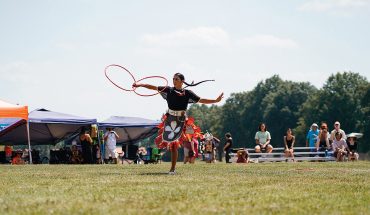by Todd Cohen
photographs by Doug Van de Zande
To build a better community, it’s often necessary to lend a hand to people in need. Morrisville’s Eric Hall learned that lesson at 9 from his grandfather, a small-town grocer in Ohio.
“Families in need would come into the store, and he would set up a line of credit for them,” says Hall. “There was a sense of community. You learn how to take care of each other, and you do what’s best for people.”
Now, in a state where only 80 percent of students graduate from high school after four years, Hall, who turns 41 this month, heads Communities in Schools of North Carolina, a statewide nonprofit that helps at-risk students improve their academic performance and stay in school.
Wanting to help kids learn comes naturally to Hall, who was born in Kentucky and largely raised near Tampa, Fla. His mother, who retired last year, was a high school reading teacher, and his father still teaches high school science and coaches football.
Formed in 1989, Communities in Schools provides training, technical assistance, and support to 37 affiliates that last year provided in-school support and interventions for more than 215,000 North Carolina students who were at risk of dropping out of school or not performing at grade level.
With undergraduate and graduate degrees from the University of South Florida, Hall taught high school biology in Florida and then worked for 18 years for AMIkids, a nonprofit that develops and operates nontraditional schools for at-risk students. At AMIkids, he served as a teacher, case manager, school principal and executive director, and national director of educational services.
Hall is married to Lissette Hernandez-Hall, a social worker for the Wake County Public School System. They have an 8-year-old son and 4-year-old daughter who begins kindergarten this fall, both in Wake County public schools.
What did you learn from your parents?
The value of education, of always working hard to accomplish those things that you want in life. More importantly, the value of helping others.
Your parents both were teachers. And as a college student, you assisted your father at football practice and worked as a substitute teacher. How did that help you find your calling in education?
I always had the opportunity to see (my parents) help students and colleagues, offering extra support, showing the value of community. They were always there as a resource for anybody who needed it.
What is the state of public school education today?
The state is making some bold moves in trying to raise expectations as far as students and for our schools. Our biggest challenge is making sure that as a state we are competitive when it comes to salaries for teachers, so we can attract and retain the best teachers in the industry. Another challenge, amidst all the education reforms that are taking place, is trying to keep parents and community leaders informed. How can schools pull in the local community with resources to help them as they navigate these changes?
What inspires you?
Even though I’ve always had a strong appreciation of the importance of education, when you have your own children, it makes it that much more relevant in understanding how important it is to make sure children get what they need.
What has been the impact of Communities in Schools of North Carolina?
Over 95 percent of 20,000 students we serve in kindergarten through grade 11 with intensive case-management support were promoted to the next grade level. And 96 percent of 1,215 high school seniors we served last year with intensive case management graduated.
What’s next?
Continue to expand and reach more kids in our state. We have more than 50 counties where we do not have services in place. We are getting ready to launch services in Rockingham County. In the past, we have worked through and developed affiliates. In Rockingham County, we are launching direct services from the state office. We plan to do a pilot and see how we improve efficiencies and reduce administrative costs.
If you could fix a social problem, what would it be?
The biggest social problem would be to break the cycle of poverty. The best way to do that is to provide good quality education for children starting early on and all the way to graduation.
What motivates you each day to do something to give back?
The stories that I hear from the kids and the families we serve across the state, knowing there are real challenges out there that some of us may never understand.
What was a volunteer experience that meant a lot to you?
My work with AMIkids. My roommate in college was working with the company and got me to volunteer a couple of times at local schools. Listening to stories of students – the challenges that many of them faced day in and day out living in poverty, not achieving in school – and getting a chance to know these young people as individuals and the hurdles they needed to overcome, opened my eyes to the kind of work that goes on out there to help young people. That was a turning point for me that reinforced why I wanted to look at education as a career.
Who are your heroes?
My parents. The influence they’ve had on me and helping me to appreciate the things I do in life. They were always very good about keeping me focused on what’s positive. And Gen. Colin Powell. He always talks about fostering a “noisy” environment. When you’re working as a leader, you have to make sure you have people around you who are not just telling you what you want to hear but also what you need to hear.
What do you like about Raleigh?
The people. It’s an extremely friendly community. People take a strong interest in the community. I love to see how the business community takes an interest in education.
Who do you admire in Raleigh?
Linda Harrell, the founding CEO at Communities in Schools of North Carolina. She lives in Myrtle Beach and comes to Raleigh a lot. She started with a vision for what Communities in Schools could become in the state. By the time she retired, she was able to build a network that was reaching more than 200,000 kids.
What is a pet peeve?
Making excuses. In the social services and education, with the ability to have direct impact on people’s future, one thing that really bothers me is when people make excuses about what we can’t do rather than trying to find solutions to what we can do.
What do you do for fun?
I love to exercise, to take the kids and do things at parks and museums. Every once in a great while, I like to do whitewater rafting in the Nantahala River. I love the outdoors, hiking trails.
What is your philosophy of life?
Enjoy life and do all that you can to make a difference.
What does philanthropy mean to you?
Doing as much as you can to help others. Don’t give until it hurts; give until it feels right.
What is your favorite book?
Pedagogy of the Oppressed, by Paulo Frerie. It helped open my eyes about the importance of education and, in the absence of access to quality education, how oppressive that can be to various groups of people.





